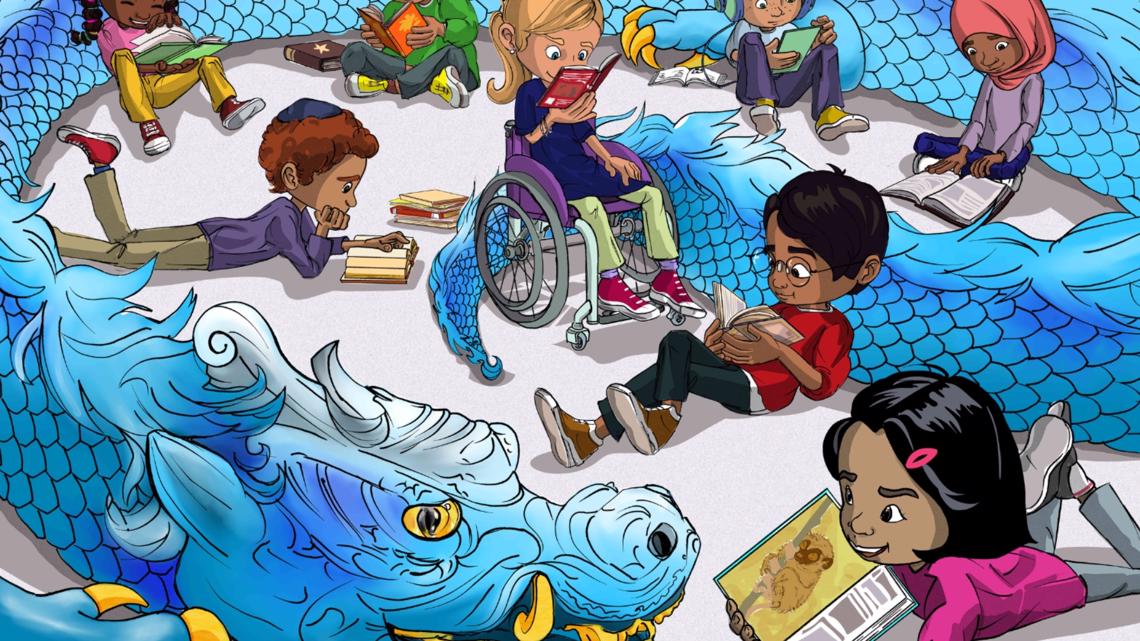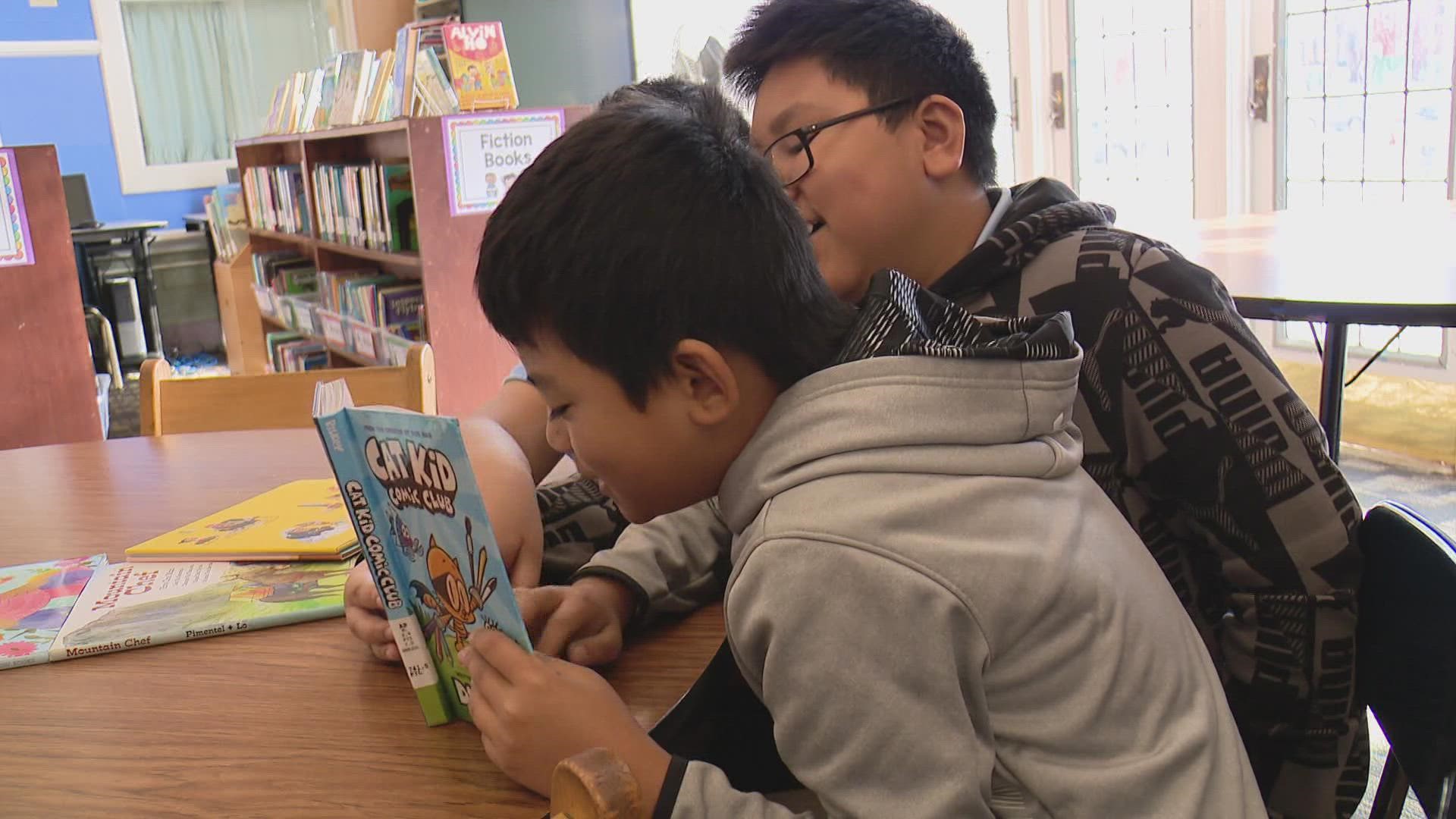SAINT LOUIS, Mo. — A national effort to build more inclusive libraries is kicking off in St. Louis, and while it is focused on Asian American youth, it's an effort geared to support all young readers.
In St. Louis, Emerson Electric is donating thousands of dollars to donate roughly 250 books to school libraries, starting with Woerner Elementary on the city's south side. Woerner Elementary's student population is made up of nearly 50% of English language learners who also speak languages like Nepali, Vietnamese, and Jrai.
"To see their faces when they see themselves in books is worth about a million dollars," said Susan Dooling, Woerner's librarian. "It is just amazing."
Dooling says her students notice right away when they see characters who look like them, and she says it's good for all young readers.
Rudine Sims Bishop, a national scholar who has been referred to as the mother of multicultural children's literature, has famously said books need to be mirrors and windows for young readers. In other words, students need the opportunity to see themselves in books, and they need to learn about others' lives through books.
"It is so important for kids to see themselves in books," said Dooling. "That's why we as librarians do what we do so that we can make sure that all our students are represented in what they read and what they see. When they are able to see themselves in a book, they're recognized. They feel like people see them."
Dooling's school library received a sizeable donation of about 100 Asian American youth literature books comprised of picture books and early readers, made possible by Emerson Electric's foundation, which pledged in March to devote $200 million in charitable contributions during the next decade. Emerson is working on identifying other St. Louis-based schools to donate more books. Dooling nearly cried when she learned the books were for the library to be checked out over and over again – noting the impact would be substantial.
For background, the effort to connect corporate sponsors to community and school libraries is part of The May Book Project, an idea inspired by St. Louis high schoolers. In 2021, members of the student-led Asian American Civics Scholars created an Asian American book list and asked several schools to buy more books for their libraries for the month of May, which is also Asian Pacific American Heritage Month. Their requests that year went largely ignored, despite a spike in anti-Asian hate and discrimination reports around the country.
"Only one [school] acknowledged our call to action," said Joyce Sung, a St. Louis high school student.
"[It was] severely underwhelming," said Ananya Shah, an Illinois high school senior. "We decided that we want better."
In early 2022, the students held a panel discussion with The Very Asian Foundation with other high schoolers from around the country. They each talked about the challenges of being dismissed by their schools while feeling hyper-visible in their communities. During the height of the pandemic, many of these students experienced frightening encounters in grocery stores or restaurants from people who told them to "go back to their country" or blamed them for "Kung flu."
The high schoolers shared how their mental health had deteriorated during the pandemic from not having the resources or support they needed. Some started a side chat sharing they or their peers had created suicide plans. The number one cause of death in Asian American youth is now suicide – the only age group that faces this challenging statistic.
After that student panel discussion, The Very Asian Foundation worked with national scholars to take the students' list and turn it into an academic project. Sarah Park Dahlen, an associate professor in the School of Information Sciences at the University of Illinois at Urbana-Champaign, convened a group of scholars, authors, educators, librarians and non-profits to create a robust, vetted book list of about 250 books from the youngest readers to young adults.
See the book lists: Picture books, early readers, middle grade, young adult, adult crossover
APALA, the Asian/Pacific American Librarians Association created a toolkit on ways to maintain or build more inclusive libraries using the existing academic rubric to evaluate Asian American and Pacific Islander Youth Literature. One example – the APALA rubric suggests that books with slanted eyes and yellow skin in both text and illustrations should be looked at critically when evaluating or reviewing Asian American youth literature.
Other groups like The Asian Authors Alliance and the non-profit We Need Diverse Books worked on the project to connect authors to the project, once finished, and to work on the logistics of donating books to at-need libraries and raising awareness of the project itself.


The May Book Project provides free resources that support libraries in making their own choices to celebrate diversity. It is designed to lend a hand when needed and allows librarians to make decisions that work for them. The guides are a vetted, high-quality list created by experts and academics across fields.
Missouri's State Librarian Robin Westphal praised the list and promised to distribute it to all of the 150-plus library districts in the state. The St. Louis County Library District Foundation sponsored an author visit from New York Times Best Selling Author David Yoon and bought out the complete book list for its patrons.
A Rockwood School District library committed to buying more books off the list, the Clayton School District hosted an author discussion via zoom, and parents of an elementary school in Los Angeles held a book drive to fill a library. Libraries in Washington state, Minnesota, Wisconsin, New Jersey and North Carolina are also working to bring The May Book Project books to their schools and community organizations.
"We're excited to be part of The May Book Project," said Dr. Cameron Poole, the chief equity and inclusion officer at the Clayton district. In May, the district hosted a virtual event with Missouri author Ed Shew who wrote the book Chinese Brothers, American Sons.
“Students who see themselves reflected in their curriculum and in the books in their libraries experience a greater sense of belonging in their schools," said Poole. "Ensuring that our students have access to books that share these rich, diverse stories aligns directly with our efforts to ensure that Clayton schools are indeed a place for everyone."
It's taken months to coordinate fundraising and book drop-offs. The project works primarily with Yu and Me Books based in Manhattan's Chinatown and is New York City's first AAPI woman-owned bookstore. The store shipped Emerson's donation from its storefront on the east coast to the heart of America.
"We think books are invaluable assets," said Helena Wu, the St. Louis chapter chair for Emerson's Asian employee resource group. "It was a very rewarding experience, and I'm very excited to see the smiling faces of those children and their parents. It's just touching my heart."
It was a touching moment for students as well.
"It makes me pretty inspired how people write what they're experiencing and how they are dealing with it," said Brianna Vo, a 5th grade student at Woerner. "It's pretty nice."
Fourth grader Anisha Bista said she likes having books that help her peers understand her more.
"It's special to get to see yourself," said Bista. "And people can read about you so they can know more about you."
Ishan Uperti, a fourth grader at Woehner, loves stories about science and animal adaptations. He reminds us that books don't have to be about Asian people themselves, sometimes it's just about the exposure.
"There should be more Asian American books," said Uperti. "There aren't a lot of Nepali or Vietnamese books in the school right now, so I'm kind of surprised because it's such a huge library."
He has advice for other students hoping for more representation.
"Just keep trying to find more that's going to inspire you," said Uperti. "Don't give up on it."
As awareness grows for The May Book Project, more corporations are committing to supporting Asian American youth, a minority group that historically has been under-indexed because of stereotypes that Asian Americans do not need help. Research shows that Asian Americans have the largest wealth disparity gap among all groups.
The self-care brand Asutra owned by Stephanie Morimoto and Venus Williams committed to donating thousands of books to libraries across the country. Barilla, RGA, American Family Institute, and Microsoft have also become corporate partners.
"We are fully committed to donating books to libraries that cannot afford to add to their collections," said Soogi Hong, executive director of the Very Asian Foundation.
Hong said she is looking for more volunteers to take interest in how the project can take shape in their own communities.
Students continue to drive the project forward. Cassie Sun, a senior at Marquette High School, is a May Book Project student ambassador. She read to younger students at Woerner Elementary at a short program to support the Emerson book donation. She also approached her own school librarian and simply asked if they could buy more books. The answer was as simple as the question: yes. The next step is determining which books and when to purchase them.
Asian American Civics Scholars students recently ran a competition to see which St. Louis area high school could make the most calls to help with voter registration. The winner received 10 books of their choice from The May Book Project list, donated by the Very Asian Foundation. The winner also got to pick a school to donate 10 more books to as well.
Junnie Bae is a St. Louis-raised student now at Columbia University. He helped bring the project to light his senior year and said at the end of the day, it's about young people feeling valued and getting support from adults.
“If we’re able to spark these discussions by taking the small step of sharing these diverse stories of Asian American authors, it would be monumental for ensuring the safety and well-being of the AAPI community at large,” said Bae.

